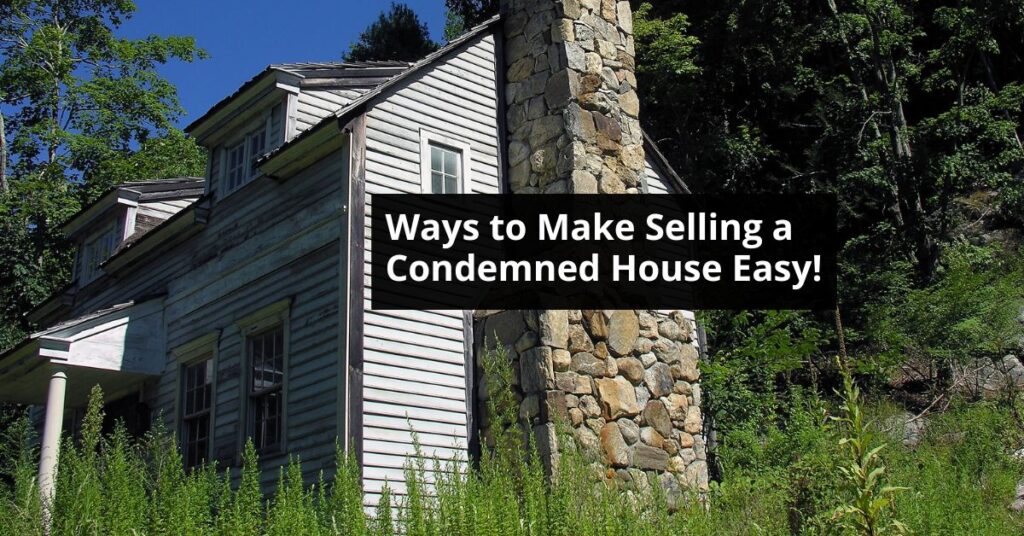It’s always exciting to get a new client listing, and finding out the house is condemned does not make it a bad thing. It gives you the opportunity to show how you as an agent can handle all types of situations. And when the sale is complete, you can get a fantastic case study or testimonial for your website! So if you’re ready to help your client sell their condemned house, here are some of the ways you can get it from MLS to closing without the headaches.
The first thing to do is find out why the house is condemned. Many times it is easy to have the condemnation removed. Removing the condemnedation can help increase the sale price while also removing the stigma attached to the house.
Three of these include:
- Hoarders – Get a storage unit for the owner to put their belongings in. Their “possessions” will be safe and the process of being non-condemned will begin.
- Although there is also a psychological aspect only a licensed professional will be able to help with.
- Utility issues – Contact the local utility providers to have the gas, electricity, and water re-connected and turned back on. Once running, the designation can be lifted.
- Infestations – Hire an extermination company and eat the price if the commission on the sale will be higher than the cost to exterminate.
If the house has a stigma in the neighborhood because of the condemnation, you may want to have a title search done by a reputable title company. By having a title search done, you may discover this is not the first time the house as had issues. The public records may open up unknown causes of other stigmas that you’ll be able to overcome once the house is ready to show. This includes previous condemnation proceedings, and may uncover any liens that affect the property. If the condemnation puts any property-use restrictions on the deed, these will also show up during the search. Knowing this information is a good thing. You’ll be prepared to answer potential buyers questions about the history of the home vs. being caught off guard. And it helps you check for defects that need to be disclosed. And don’t panic if there are past problems.
It’s always good to remember that there’s a buyer for every type of property. One approach is to highlight a property’s most favorable features like a large backyard or desirable location near a good school. You can also showcase any distinctive features the property may have.
Pro-tip: Create a checklist of upgrades to help potential buyers imagine the possibilities with the property. It could be adding a patio and grill pit, digging a stunning swimming pool, or building a tree house and jungle gym for their kids. You can take it a step further by hiring a designer on upwork or fiverr to sketch out what the yard could look like with each of these. You’ll be inspiring the buyer with opportunity vs. only showing a condemned property.
You can also focus marketing efforts to attract potential buyers who are interested in investment properties, fixer-uppers, or affordable homes. The shift here in your listing will emphasize the potential investment opportunity instead of focusing on selling points for the buyer as a home. These buyers are going to be more savvy, especially if they’re experienced investors, so be honest about the property. They already know to expect the worst, and be strong with bargaining and negotiating, they expect that too! And this is where setting expectations with the seller comes in.
When discussing the sale of a condemned property with a homeowner, approach the situation with empathy and sensitivity. Explain the property’s condition and how it may affect its value compared to similar homes in the neighborhood. You can go a step further and help them create a comp. And make sure to highlight the positive aspects like the opportunity to move on to a new home and features that do hold value and can keep the selling price up a bit. You can also offer local resources and guidance to help them find suitable housing or legal assistance if their situation is dire. Taking a compassionate, upfront, and practical approach can help the homeowner navigate this challenging situation and achieve the best possible outcome. And that brings us to the last step, sealing the deal.
Closing on a condemned property can be complex because there could be title issues with liens, encumbrances, and legal requirements that must be met before the property can be sold. As a real estate agent, be prepared to navigate these issues and work with your clients to find effective solutions. By having a plan before you get to the closing table, you can help make the process go smooth. This may involve coordinating with local authorities or negotiating between the buyer and seller.
While condemned properties can seem challenging at first, they also present an opportunity for you to showcase your skills and expertise. Successfully navigating such a complicated transaction can build your portfolio and demonstrate your resourcefulness and ability to handle any situation. With the right approach and mindset, you’ll feel empowered and excited knowing you have the knowledge and skills to help your clients achieve their goals!

